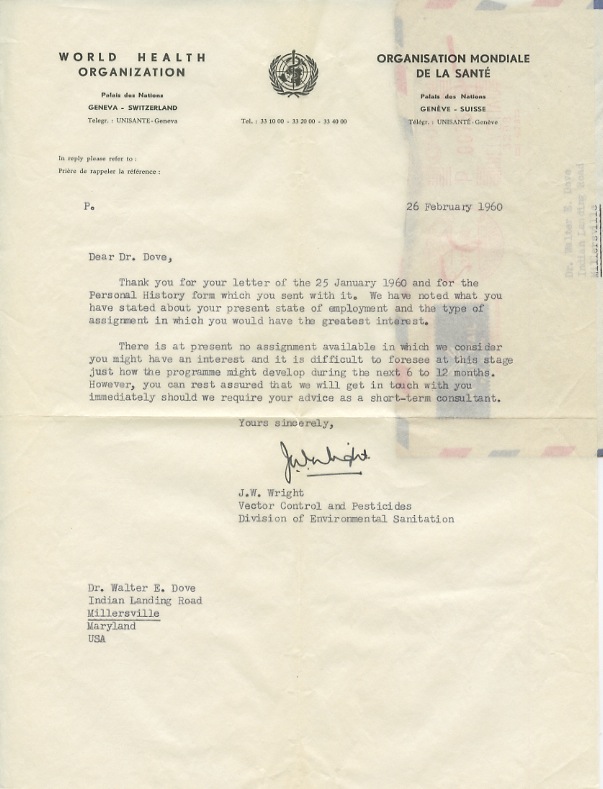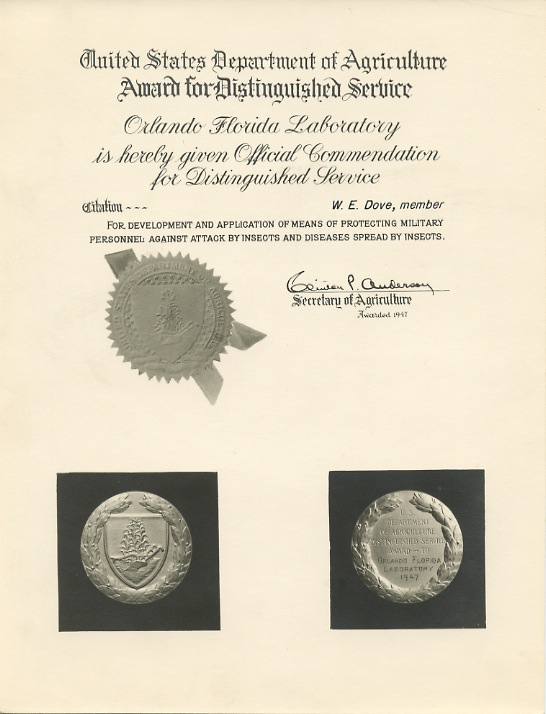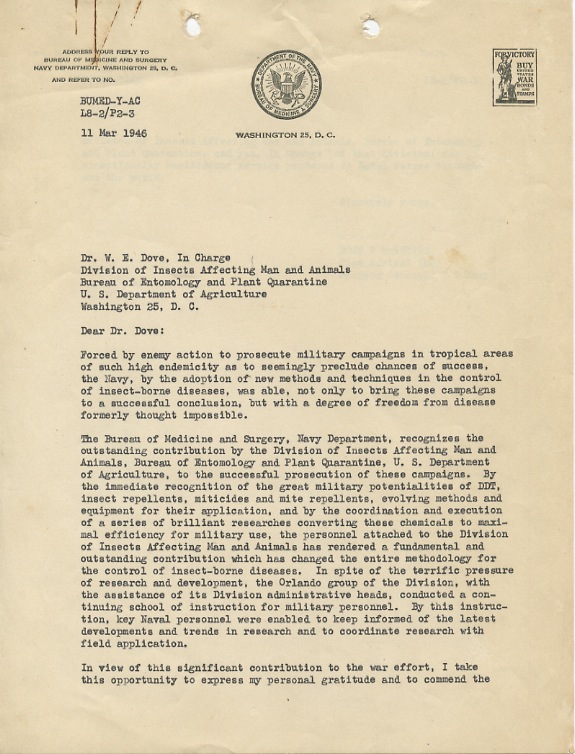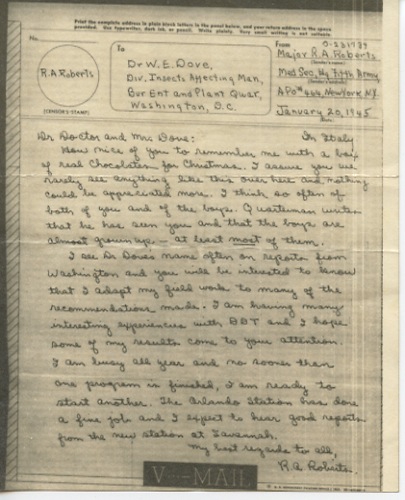Walter apparently applied for work with the World Health Organization. At this point, the WHO was five years into the doomed Global Malaria Eradication Programme. The program relied primarily on DDT, a compound on which Walter was probably the world’s foremost expert at that time. It seems the WHO wasn’t interested in what he might have to say about it.
Tag Archives: DDT
1947
March 11, 1946
Letterhead from the Bureau of Medicine and Surgery, Navy Department, Washington, D.C.
11 Mar 1946
Dr. W. E. Dove, In Charge
Division of Insects Affecting Man and Animals
Bureau of Entomology and Plant Quarantine
U.S. Department of Agriculture
Washington 25, D.C.
Dear Dr. Dove:
Forced by enemy action to prosecute military campaigns in tropical areas of such high endemicity as to seemingly preclude chances of success, the Navy, by the adoption of new methods and techniques in the control of insect-borne diseases, was able, not only to bring these campaigns to a successful conclusion, but with a degree of freedom from disease formerly thought impossible.
The Bureau of Medicine and Surgery, Navy Department, recognizes the outstanding contribution by the Division of Insects Affecting Man and Animals, Bureau of Entomology and Plant Quarantine, U.S. Department of Agriculture, to the successful prosecution of these campaigns. By the immediate recognition of the great military potentialities of DDT, insect repellents, miticides and mite repellents, evolving methods and equipment for their application, and by the coordination and execution of a series of brilliant researches converting these chemicals to maximal efficiency for military use, the personnel attached to the Division of Insects Affecting Man and Animals has rendered a fundamental and outstanding contribution which has changed the entire methodology for the control of insect-borne diseases. In spite of the terrific pressure of research and development, the Orlando group of the Division, with the assistance of its Division administrative heads, conducted a continuing school of instruction for military personnel. By this instruction, key Naval personnel were enabled to keep informed of the latest developments and trends in research and to coordinate research with field application.
In view of this significant contribution to the war effort, I take this opportunity to express my personal gratitude and to commend the Division of Insects Affecting Man and Animals, Bureau of Entomology and Plant Quarantine, and you, In Charge of that Division, for exceptionally meritorious service rendered to Naval forces throughout the world.
Sincerely yours,
Ross T. McIntire
Vice Admiral (MC)
Surgeon General, U.S. Navy
June 30, 1945
This organizational chart shows Walter’s Division in the USDA, just a short time before he quit. As the war started winding down, the Department shifted its focus back to its usual beat, boosting the yields and sales of US-grown crops. They also began looking for peacetime uses of technologies developed during the war, including the amazing new lousicide Walter’s group had worked on. Walter didn’t document his thinking about this, but various family stories and some of his publications hint that he wasn’t at all pleased with the idea of spraying DDT on crops. In one paper from 1945, he described the compound as “definitely toxic,” and argued that it might have harmful effects in the environment when used in large quantities for extended periods of time.
By mid-1946, he had left the Department and taken a job with US Industrial Chemicals in Baltimore, where he began working on improving pyrethrum-based insecticides.
June 30, 1945
January 20, 1945
Army V-Mail.
Major R.A. Roberts
Med Sec, HQ Fifth Army
APO 464 New York, N.Y.
January 20, 1945
In Italy
Dr Doctor and Mrs. Dove:
How nice of you to remember me with a box of real chocolates for Christmas. I assure you we rarely see anything like this over here and nothing coudl be appreciated more. I think so often of both of you and of the boys. Quarterman writes that he has seen you and that the boys are almost grown up – at least most of them.
I see Dr. Dove’s name often on reports from Washington and you will be interested to know that I adapt my field work to many of the recommendations made. I am having many interesting experiences with DDT and I hope some of my results come to your attention. I am busy all year and no sooner than one program is finished, I am ready to start another. The Orlando Station has done a fine job and I expect to hear good reports from the new station at Savannah.
My best regards to all,
R.A. Roberts
Dec. 26, 1944
Army V-Mail.
Lt. Col. Emory C. Cushing
Office Chief Surgeon
APO 887 c/o Postmaster
New York N.Y.
Dec. 26, 1944
Dear Walter:
Many thanks for the box of delicious candy you remembered me with on Xmas. We don’t get much of that kind over here and it will be a big help in keeping up the calories during the cold days.
How is the Division faring these days? It seems like a lot of organizations want to get on the DDT band wagon and I am concerned about what might happen to the Division’s work during the post-war period with so many chiselers at large. What about the entomologist the SGO wants on its insect committee? For heaven’s sake help them to get someone that’s got his feet on the ground and with lots of common sense. They have needed one for a long time. While I may not be able to furnish the above qualifications, I would certainly like to have that job. Could you put in a plug for me?
Give my love to Ina and the boys. I hope you all had a Merry Xmas and that the prospects for the New Year come to full fruition.
Sincerely,
Emory
January 1, 1943
Central Laboratory 505
APO 505
c/o Postmaster
New York, N.Y.
Personal Please
Dear Dr. Dove:
I suppose you have been advised by this time of my safe arrival at destination. We had an uneventful trip and everything is going along as well as can be expected under the circumstances. Like every ponderous machine it moves slowly but with ever increasing momentum. Living conditions are not at all bad and except for missing Deniza and all my friends I am quite contented with my lot.
Because of certain restrictions, it is almost impossible to give much in the way of happenings. I am greatly impressed with the importance of the eventual problems with which [redacted] you and I and especially the boys at Orlando are concerned. We cannot do too much too soon. Many problems present themselves and it is difficult to keep on the straight course of dealing entirely with the primary one; nevertheless some of them cannot be ignored and it is often necessary to take on additional responsibilities and give help wherever possible. In this connection I shall appreciate your sending me my copy of “Human Parasitology” by Blacklock, and the copy of “Parasitology” by Hegner, Root, and Augustine. I think you will find them amongst the books I left in the office. If you could procure for me a copy of the recent edition of “Medical Entomology” by Herms I should like to have that too. Deniza will reimburse you for whatever it costs. Perhaps you could expedite delivery to me by asking Col. Stone to send them with other official mail. There is, upon my suggestion, an interest in Freon as carrier and dispenser of bactericides for preventing air-borne infections. You might ask Col. Stone if it would be possible for his office to send me two 25 lb. cylinders of the material direct together with 5 empty 5-lb. dispensers and full instructions as to equipment for filling the small cylinders from the large ones. This equipment is also desired in connection with other work which has been assigned me. There is no use of my ordering it through channels as it does not appear on regular supply tables available here and I shall have to write elaborate specifications. Another problem to which I must give attention is the prevention of scabies. If it is possible and not too inconvenient I would appreciate your discussing this with Dr. Haller and Col. Stone and sending me at least gallon samples of any promising liquid acaricides especially emulsions or solutions of the less irritating derris or cube derivatives. The necessity for liquids is that of rapid application as a spray and the treatment of a considerable number of persons in a short time. As soon as you develop any promising lousicidal powder I should like to have samples to determine their efficacy in preventing sarcoptes infestation. Should opportunity afford research work there on scabies prevention and rapid treatment would be well worth while. One last request, could you discuss with Dr. Calvery of Food & Drug what his organization has found out about commercial wetting agents which are non-toxic to man and if he knows of any forward samples to me through Col. Stone. I know you must be extremely busy at this time and I trust the above requests will not be of too much trouble to you. How is everything going at the office? Give my best wishes to everyone in the Division and all my friends in the Bureau. How is Ina and the boys, Claudelle and B.M.? Please remember me to them. I think the above address will be rather permanent for me so if you can find a spare moment to write I shall be delighted to hear from you.
Sincerely
Emory C. Cushing, Maj. 5th C.[?].
Notes on the back of the envelope in Walter’s handwriting:
sesame
cotton seed
corn
Gesarol
Gesarol is the same as Neocid – both are Geigy trade names for a novel compound Walter and his colleagues are testing as a possible lousicide.
March 9, 1942
Walter and Ina are now moving to Orlando so Walter can run the new insecticide research facility the USDA has set up there. They’re going to be testing any chemicals they think might work against disease vectors, especially lice and mosquitoes. Various companies make compounds that are purported to kill insects, but most are just marginally effective extracts from pyrethrum daisies, or toxic arsenic-based products. Chlorpicrin (tear gas) and a new compound from Geigy called Neocid look promising, but nobody knows whether either will actually work under field conditions. The Orlando lab’s job is to get those data, and then develop practical insecticides if possible.
Monday P.M. 3/9-42
My dear Ina & Boys,
I arrived here at 4:30 PM Eastern War time which made 11 hours to get here, a distance of 348 miles by the speedometer. Mr. Glass had already arrived & he was looking for an apartment with Mr. Burris the realtor. They came back to the lab just as I got out of the car. I went with Mr. Burris to see Mrs. Smith & I gave a check for $45. Of this $30 is the balance of 1 month’s rent & $15 covers deposits & gas electricity & water. The realtor will make the deposits & get the services connected. It is a good thing that I made a deposit with Mrs. Smith. One party has been trying all day to rent the house & she had made them wait until tomorrow. Mr. Glass helped me unload the car & we put the things inside. THe house looks even better than it did the other day. There is a closet in to the sleeping porch room & big closets in other rooms. Also shades are on all windows except the 2 little windows over the book cases. The bed rooms seem a little larger than they did the other day.
Mr. Bushland asked me to use their day-bed tonight & I will go out there. Tomorrow I’ll get the bed material that Ed brought down & fix a bed at the house. I am writing this in the car because I do not have a key yet & all are away just now.
With love
Walter.






